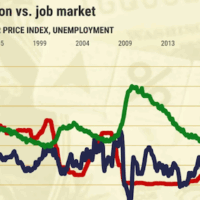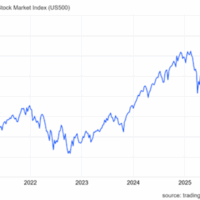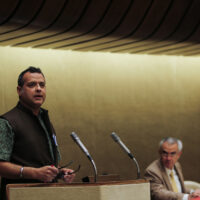-
The Radical Potential of Consumer Financial Protection with Vijay Raghavan
We speak with Vijay Raghavan, Professor of Law at the Brooklyn Law School, about his recent article, “The Radical Potential of Consumer Financial Protection,” published in Boston College Law Review in April 2025. Raghavan builds on the work of constitutional money theorists, as well as his legal experience in the public sector. In particular, he argues that consumer financial protection is an essential and potentially radical response to the “finance franchise,” a predominantly anti-democratic process by which modern governments delegate the money creation process to private actors like banks.
-
India’s reckoning with Trump’s tariffs
There are two reasons for the U.S. tariffs imposed on India: first, India’s refusal to open its agricultural market to U.S. imports; second, India’s refusal to stop purchasing oil from Russia.
-
Going off script: Our front row view of another Kerala story
The state is far from perfect. But it offers a glimpse of what the world could look like when human well-being is prioritised in everyday life.
-
Deciphering the MAGA Ideology: An Interview with John Bellamy Foster
This interview was conducted by Zhao Dingqi for the journal World Socialism Studies. Zhao Dingqi: You once pointed out that the MAGA movement is essentially an alliance between the monopolistic capitalist right wing and the lower middle class. How do you understand the reasons behind the formation of this alliance, and how does it reflect […]
-
Stagflation returns, shining a spotlight on the Federal Reserve’s war on the working class
History exposes the Fed’s inflation fight for what it truly is: a decades-long class war waged against working people under the guise of monetary policy.
-
Tariffs and the U.S. economy
The U.S. has a record high stock market, unlimited spending on AI capacity by the tech giants, along with sharply increased borrowing to pay for it; but no sign yet of any significant revenues or profits from AI—and alongside that: a slowing rest of the economy, a widening trade deficit in goods and increasing unemployment and prices. All this as we go into the second half of 2025.
-
Carney is pushing Canadian liberalism to its breaking point
Bill C-5, Indigenous resistance, and the authoritarian turn at the heart of the settler state.
-
How U.S. imperialism blackmails the world with nuclear weapons, from Hiroshima to today
Since the U.S. dropped an atomic bomb on Hiroshima on August 6, 1945, U.S. imperialism has driven nuclear proliferation worldwide. Current nuclear flashpoints, such as Iran, show how the U.S. continues to use nuclear blackmail to reinforce its dominance.
-
The World in a Nutshell: An Interview with Vijay Prashad
VP: “Marxism, which is an ever-evolving field of analysis, is the most accurate critique of capitalism. As long as capitalism remains with us, Marxism must remain until another form of critique—better than Marxism—appears.”
-
Unilateral and illegal sanctions–mainly by the United States–kill half a million civilians per year: The Thirty-First Newsletter (2025)
A study in The Lancet estimates that unilateral sanctions have caused as much death as wars, with an estimated half a million deaths per year.
-
When climate becomes class war
As climate collapse accelerates, its unequal impacts reveal the class divisions at its core.
-
‘Sanctions as deadly as war’: Lancet study finds U.S.-led sanctions kill over 500,000 people annually
U.S.-led sanctions have functioned as ‘silent killers’ in countries such as Iraq, Syria, and Venezuela.
-
Samir Amin facts for kids
Samir Amin is known for his ideas about how the world economy works. He also introduced the term Eurocentrism in 1988. Many people see him as a leader in Dependency Theory.
-
Japan: stagnation and confusion
Prime Minister Shigeru Ishiba, who heads the LDP, has intensified his rhetoric on issues appealing to conservatives, the core LDP base.
-
Black Americans hit hard as medical debt rule tossed
A Trump-appointed federal judge has blocked a key rule that would have removed medical debt from the credit reports of roughly 15 million Americans, dealing a harsh blow to struggling families already burdened by the high cost of health care, particularly Black Americans who carry a disproportionate share of that debt.
-
Revisiting Paul Baran’s ‘The Political Economy of Growth’ for today
For Baran, the key to liberating the former colonies from the stranglehold of rapacious monopolies is not a reordering of international relations, not a campaign for a level international playing field, not alternative market institutions, nor a coalition of dissenters from the status quo, but a radical change in the social and economic structure of the oppressed country.
-
Palestine and the Commons: Or, Marx and the Musha’a
In 1958 the assistant headmaster did the Bible reading at the morning assembly of the Karachi Grammar School (Pakistan), founded in 1848 by the Church of England. The reading from Acts 17:23 concerned St. Paul’s declaration upon seeing the Athenian monument to an unknown God. “What you worship but do not know—this is what I […]
-
Israel’s genocide is big business–and the face of the future
U.S. corporations and military planners welcome the ‘legal maneuver space’ Israel has opened up for them to profit from warfare that slaughters and starves civilians.
-
Writing about the oil business and ignoring the fate of the Earth
Despite this dire backsliding on climate policy, with consequences that are clear as day, it’s business as usual in the realm of business news.
-
India’s growing income inequality
THE World Bank has recently published a list of Gini coefficients for 61 countries relating in some cases to income distribution and in others to consumption expenditure distribution.




















